An Phoblacht, Vol. 1, No. 4
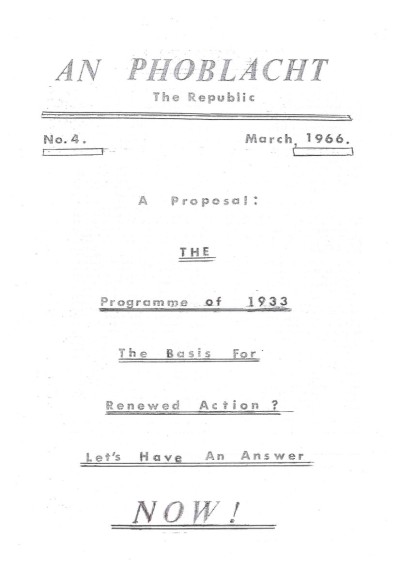
| Date: | 1966 |
|---|---|
| Organisation: | Irish Revolutionary Forces |
| Publication: | An Phoblacht [IRF] |
| Issue: | Volume 1, Number 4 March 1966 |
| Type: | Publication Issue |
| View: | View Document |
| Discuss: | Comments on this document |
| Subjects: |
Please note: The Irish Left Archive is provided as a non-commercial historical resource, open to all, and has reproduced this document as an accessible digital reference. Copyright remains with its original authors. If used on other sites, we would appreciate a link back and reference to The Irish Left Archive, in addition to the original creators. For re-publication, commercial, or other uses, please contact the original owners. If documents provided to The Irish Left Archive have been created for or added to other online archives, please inform us so sources can be credited.
Commentary From The Cedar Lounge Revolution
22nd July 2013
Please note: Issues 3 and 4 of An Phoblacht were added to the Irish Left Archive on the Cedar Lounge Revolution together, with the following commentary.
It is hoped to bring you the full run of An Phoblacht’s, published by the Irish Revolutionary Forces, the Cork based republican socialist group composed in the main of former members of the IRA, over the next year with editions being posted up on a regular basis.
These editions are of considerable interest and the indexes are attached, however, in order to get a sense of them a number of quotes from their editorials will suffice. The editorial in No. 3 is written in the context of the Sinn Féin Ard Fheis and it takes to task the ‘economists’ within SF. These it suggests:
…consider it practical to salvage our chaotic economic position by developing a co-operative system of land management in areas of low yield; and by encouraging the growth of credit unions and by establishing a state banning system so as to make available cheap credit for both industrial and agricultural development.
It further criticises ‘Tom Gill, President of Sinn Féin’ for misquoting Connolly by replacing ‘state ownership’ with ‘co-operative control’. And it argues that what SF is advocating at this point is similar to that of Horace Punkett. It continues with the contention that:
The trouble with Sinn Féin is that its leaders have in some degree come to appreciate the capitalist content of their organisation’s economic policies that were inherited from Griffith. They have a vague idea that these are bad; but they actually do not know yet why this is so. On the other hand, they view socialism through bourgeoise spectacles, so that they find it difficult to accept the economic tenets of socialism as an alternative to their aid policies. Still, they cannot condemn socialism outright: obviously it has achieved a lot of good in many areas. Hence the perplexity which Mr. Gill endeavours to solve by saying “Communism… as it has manifested itself in many countries… is not an ideology which would commend itself to the Irish people.’ The ambiguity of this statement is apparent. Is he issuing a blanket condemnation of communism? Or, is he merely condemning that which manifests itself in many socialists countries, as distinct from all socialist countries? Frankly we don’t know.
It concludes by suggesting that:
Words are easy enough to employ: and safer by far than deeds. If Sinn Féin truly desires to embark on a revolutionary road, then let us see some action in that direction. Let them dispense with the flowery phrases and proceed with the work in a pragmatic and honest fashion. When that day appears, this little paper will have done its work. It will then be silent.
In many respects issue number 4 continues this line of thought. It argues that:
Ireland requires the services of an active revolutionary movement if our people are to survive as a self-respecting community with complete control over its own destiny. Unfortunately no such movement exists today.
It argues that: “the main problem with presently functioning Republican organisations, is that they abound in the making of a large volume of incoherent noises, without giving any thought whatever to the substance of revolutionary action itself.”
For instance, Republican Leaders will talk their heads off on the subject of the I.R.A. Fighting for Irish Freedom, when they appear at some commemoration or other. But they make no provisions for such a struggle: and from private conversations with them, it becomes very apparent that they haven’t a clue as to how such a war is to be waged, and they show no desire to find out.
It continues:
Also to hear some of them ranting about their new found toy, ‘the economic resistance campaign’ one could easily be mislead into the belief that their economic policies, if ever put into effect, would mean a new and dynamic era for the Irish people.
It suggests that:
The Men of 1916, whom the parasites are now preparing to commemorate, sacrificed their all to rescue the people from the debasing effects of parliamentary opiumism. It was a big price to pay for national salvation, as many an Irish revolutionary has since come to realise; and it will be tenfold greater if we of this generation do not stand squarely behind our responsibilities. The men of 1916 had to do what was necessary, regardless of what was possible, in order to keep the Irish Revolution on the right track. Today, we can still chart our course between the necessary and the possible. But the time is running out, and that juncture is fast approaching where such manoeuvrability is once more denied us. IT IS FOR THIS REASON THAT WE CALL FOR ACTION NOW.
No. 3 An Phoblacht January 1966
Editorial P. 2
The Editor’s Post Bag P. 5
The Second Act of Union ! P. 7
Sinn Fein and the Labour Party P. 11
The Need for Revolutionary Leadership P. 12
A Primer on Revolt. Part 1 P. 13
A Voice from the Past P. 16
No. 4 An Phoblacht March 1966
Editorial P. 2
The IRA Programme of 1933 P. 4
Beware ! Politicans on the March P. 6
Treachery by Union Bureaucrats P. 7
The Free State Regime P. 8
A Primer on Revolt. Part 1 continued P. 9
More from An Phoblacht [IRF]
An Phoblacht [IRF] in the archive
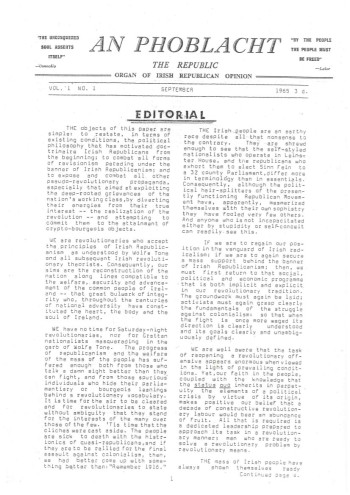
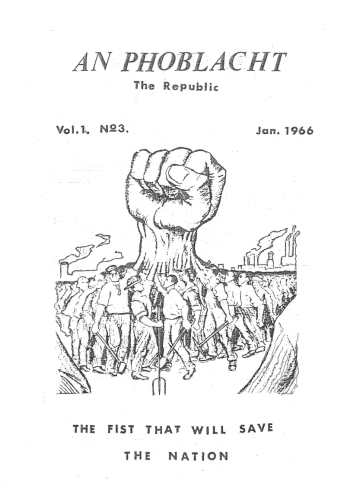
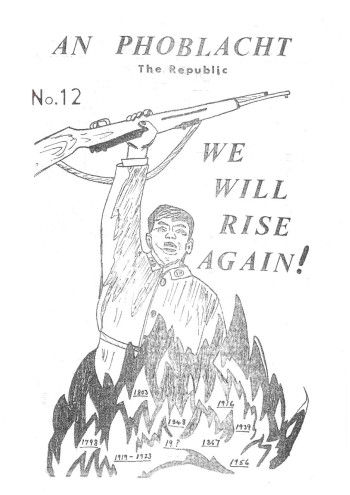
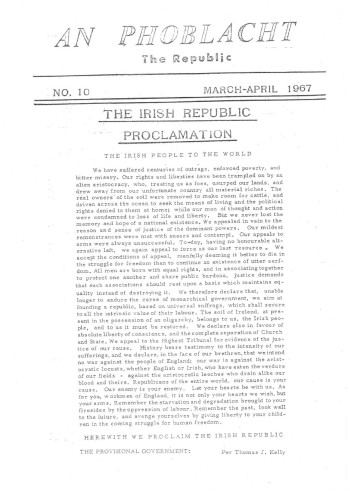
Comments
No Comments yet.
Add a Comment
Comments can be formatted in Markdown format . Use the toolbar to apply the correct syntax to your comment. The basic formats are:
**Bold text**
Bold text
_Italic text_
Italic text
[A link](http://www.example.com)
A link
You can join this discussion on The Cedar Lounge Revolution
By: coilte Jim Lane, I sent a comment some minutes ago and it has not yet appeared. Tue, 23 Jul 2013 16:31:51
xx
Reply on the CLR
By: Mick Tue, 23 Jul 2013 16:41:49
Workers republic if you are interested to hear if the author of an Phoblacht, would give the same advice today.
Well you can fined out because he did an interview part one about his life that will be on youtube soon.
An Phoblacht 1966 shows Sinn Fein claimed to have become socialist back in the 1960s and they have done the same in 2013 history repeating itself ?
Reply on the CLR
By: Garibaldy Tue, 23 Jul 2013 16:49:41
In reply to coilte Jim Lane, I sent a comment some minutes ago and it has not yet appeared..
It’s not trapped in the spam filter or anything, so don’t know what has happened it.
Reply on the CLR
By: coilte Jim Lane Wed, 24 Jul 2013 10:29:44
In reply to Mick.
The advise given by the people who formed the Irish Revolutionary Forces in the early 1960’s, was based more on their experiences of life in Ireland in the 1950’s, rather than on their experiences during Operation Harvest. They saw that period as one of great hardship in the lives of most people in Ireland, particularly the urban working class, rural labourers and small farmers. At that time, widespread unemployment gave rise to poverty, hunger and mass emigration to Britain and America. Confidence in the politicians of Leinster House was at a very low ebb. The De Valera attempt to build an ‘independent’ Irish capitalism behind tariff barriers had failed. Sinn Fein, which did not even see itself as a political party in the ’50’s, they made no serious attempt to give leadership to the people on the social issues that troubled them. They were unable to because their policies were quite similar to the Free State parties they derided – all were bourgeois democratic. Sinn Fein simply offered a more honest approach and pledged to do better than those they sought to replace. No thought of socialism entered their minds; they simply stuck with the bourgeois democratic concept of republicanism that was about 160 years old at that time. They considered that because it was revolutionary in Wolfe Tone’s time, it was good enough for them. It was as though everything in the world had stopped since Tone’s period. In Wolfe Tones time bourgeois democracy represented a revolutionary phenomenon and could be seen as a progressive response to the Irish situation; as a consequence, Irish republicanism could be defined as revolutionary bourgeois democracy, tailored to suit specific needs and conditions in Ireland. But long before the 1960’s, conditions in Ireland and elsewhere had changed, and the needs and demands of the people were obviously dramatically different to what they had been in the 1790’s. Bourgeois democracy had ceased to be revolutionary; it had been superseded by socialist democracy.
James Connolly was among those who understood this shift and he gave great credit to both Karl Marx and Frederick Engels for their contribution in bringing it about. He said of Marx that he was ‘the ablest exponent of socialism the world has seen, and the founder of that school of thought which embraces all the militant socialist parties of the world.’ It needs to be stressed, however, that neither Wolfe Tone nor James Connolly was a revolutionary simply because of their participation in armed insurrection; they were so because they also advocated the most advanced democratic concepts of their time: bourgeois democracy in Tone’s time and revolutionary socialism in Connolly’s.
This is the direction we advised our readers to go back back in the ’60’s, it remains the same today.
[ Footnote: In my document ” Miscellaneous Notes on Republicans and Socialism in Cork City, 1954 – 69″ on page 12, I mention that among the leading contributors to “An Phoblacht” were Sean Daly, Gerry Higgins, Jim Lane and Jack Scott.]
Reply on the CLR
By: free instagram followers website Mon, 02 Dec 2013 13:50:06
Thanis in favor of sharing such a pleasant thought, post is
good, thats whhy i have read it fully
Reply on the CLR
By: chaturbate token Hack v4.3 Thu, 20 Feb 2014 15:40:15
Informative article, totally whhat I needed.
Reply on the CLR
By: An Phoblacht – The Republic from Irish Revolutionary Forces. | irishrepublicanmarxisthistoryproject Tue, 22 Jul 2014 10:04:26
[…] https://cedarlounge.wordpress.com/2013/07/22/left-archive-an-phoblacht-vol-1-nos-3-and-4-irish-revolu… […]
Reply on the CLR